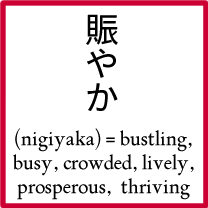
The Japanese word 賑やか / にぎやか (nigiyaka) means bustling, busy, crowded, lively, prosperous or thriving, and also loud, noisy, merry or cheerful. I find it very satisfying to say, which is why I chose to write about it today.
Here are some examples of how it’s used and related words (from Jisho.org and Reverso):
- 私の家はにぎやかな通りに面しています。 (Watashi no ie wa nigiyaka tōri ni menshiteimasu) = My house faces a busy street
- 森は鳥でにぎやかだ。 (Mori wa tori de nigiyaka da) = The wood is alive with birds.
- 夜になると屋台なども出て、たいへん賑やかです。 (Yoru ni naru to yatai nado mo dete, taihen nigiyaka desu) = At night there are food stalls and it’s very lively.
- 賑わう (nigiwau) = to be crowded with people, to be bustling, to prosper, flourish, do thriving business
- 賑わい (nigiwai) = prosperity, bustle, activity, crowd, turnout
- 賑わす (nigiwasu) = to enliven, cause a stir, hit (the headlines), make prosperous
- 賑やかさ (nigiyakasa) = business, liveliness
- 賑々しい (niginigishii) = lively, merry
- 賑あう (nigiau) = to prosper, flourish, be crowded with people
In Mandarin the character 赈 [賑] (zhèn) means to relieve or relief. It appears in such words as:
- 赈济 [賑濟] (zhènjì) = to relieve, to give relief aid
- 赈济饥荒 [賑濟饑荒] (zhènjì jīhuāng) = famine relief
- 赈灾 [賑災] (zhènzāi) = disaster relief
- 赈恤 [賑恤] (zhènxù) = relief aid
One Chinese equivalent of 賑やか is 热闹 [熱鬧] (rènao), which means bustling with noise and excitement, lively, to liven up, a spectacle, or literally “hot noisy”. Most Chinese people I know prefer places that are 热闹 to ones that are too 安静 (ānjìng – quiet, peaceful), and as most places in China and Taiwan are 热闹, this is probably a good thing.
Sources: LINE Dictionary Chinese – English, MDBG Word Dictionary
I generally prefer quiet, peaceful places, but occasionally don’t mind a bit of lively bustle. How about you?
